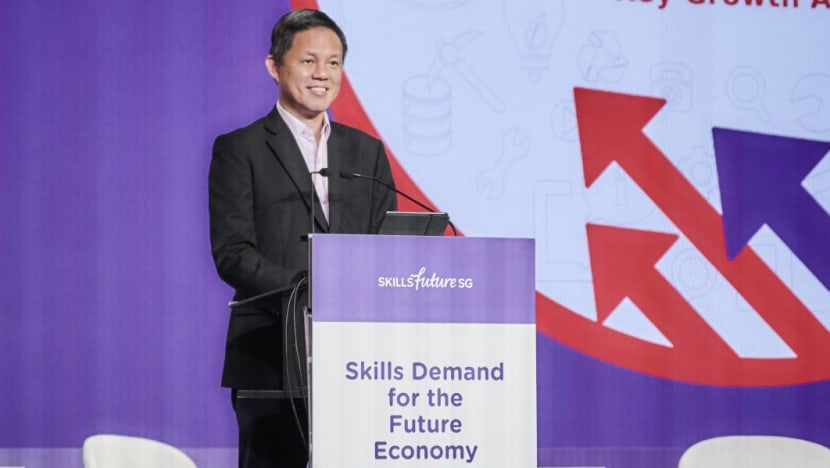Skills for the future mapped out in inaugural report by SkillsFuture Singapore
SINGAPORE: Sustainability manager, farm technologist, care manager – these are job roles that sound a little unfamiliar but may soon be mainstream.
They are among the many jobs highlighted in an inaugural report by SkillsFuture Singapore (SSG) for Singapore workers to identify “priority skills” that will be in demand in over the next three years.
The Skills Demand for the Future Economy Report, launched by Minister for Education Chan Chun Sing on Wednesday (Dec 8), highlighted three economic growth areas: The Digital Economy, the Green Economy and the Care Economy.
The report covers the top 20 clusters of priority skills for each of the three growth areas. Priority skills refer to skills that are required by the most number of job roles across the sectors under each area. The report also details job roles and courses linked to these opportunities.

Speaking at the Skills Demand for the Future Economy Forum, Mr Chan said: “As we look beyond the pandemic, one thing is for sure: The pace of change will only increase. The nature of jobs will also evolve more quickly.
“It is therefore not a matter of if, but when, the skills that we possess today will no longer be relevant.”
SSG has been tapping experts’ views, as well as using big data and machine learning to monitor job content and skills profile changes to stay on top of industry trends, said Mr Chan. The report takes this “one step further” by sharing these insights directly with the public.
“We hope that individuals will be able to contextualise the report for their own needs and situation - their work experiences, strengths and aspirations - and use this to plan ahead for their lifelong learning journey,” he said.
CARE ECONOMY TO GROW RAPIDLY
SSG explained that to determine the priority skills, it took reference from national economic priorities, as well as employer demand from big data and job postings.
One particular area with an increasing demand for skills is in the Care Economy, which includes sectors such as healthcare, community care, social service, early childhood, general education, and training and adult education.
Globally, the Care Economy is one of the fastest expanding economic sectors and the COVID-19 pandemic has further contributed to this trend, the report said.
"The pandemic has highlighted the importance of the Care Economy in our nation's resilience," said Mr Chan.
“With an ageing population, childcare to support young parents, and changes in the future of work and learning, demand for local workers in the Care Economy will continue to grow rapidly.”
The priority skills required include conduct and ethics, stakeholder management and inclusive practices, which are required across two-thirds of care-related job roles.
"As many of these skillsets are highly transferable ... we have seen individuals moving across job roles within the Care Economy, as well as pivoting from other sectors into the Care Economy," the agency said.
The Green Economy involves enterprises that are creating new business functions by shifting from environmentally harmful business activities to greener ones.
Related:
The report featured, for example, green jobs and skills required in building and construction, the energy and power sector, finance as well as in agri-tech.
For the Green Economy, SSG’s analysis has identified more than 450 job roles across 17 sectors that require green skills and these sectors range from manufacturing and trade and connectivity, to financial services and the built environment.
Clusters of these skills include green process design, carbon footprint management and sustainability management.
“Even as existing jobs get greener, there will also be new jobs created to develop and harness sustainability solutions, such as new carbon technology, solar energy and green finance," said Mr Chan.
And with digitalisation gathering pace, Digital Economy jobs can be found across many different sectors. The majority of Digital Economy jobs in Singapore are “tech-lite” roles that do not require specialised IT skills, said the report.
These include data analysts, digital marketing analysts and customer insights specialists. Some skills required in tech-lite roles are the ability to adopt and apply new technology, data analysis and market research.
For tech-heavy job roles, such as software engineers, some priority skills are Internet of Things management and data engineering.
NOT “PREDICTING THE FUTURE”
The report also featured critical core soft skills that are most in-demand, relating to critical thinking, interacting with others and being able to stay relevant by managing oneself effectively.
Mr Tan Kok Yam, chief executive of SSG, said: “I hope that individuals and enterprises will find the report useful in assessing their skills needs, and in preparing for the future.”
Mr Chan said that the report is “not an exercise in predicting the future but an exercise in being forward looking”.
“The larger objective is to raise awareness, provoke discussion and most importantly spur all of us to take action to arm ourselves with these new ‘tools’ for our future,” he said.
The report will thus be refreshed every year, and SSG will continue to work with others to identify emerging skills needs and gaps. Mr Chan called on experts, academia, career counsellors, learning designers and managers at workplaces to “join us in this endeavour”.
The report is available online.















